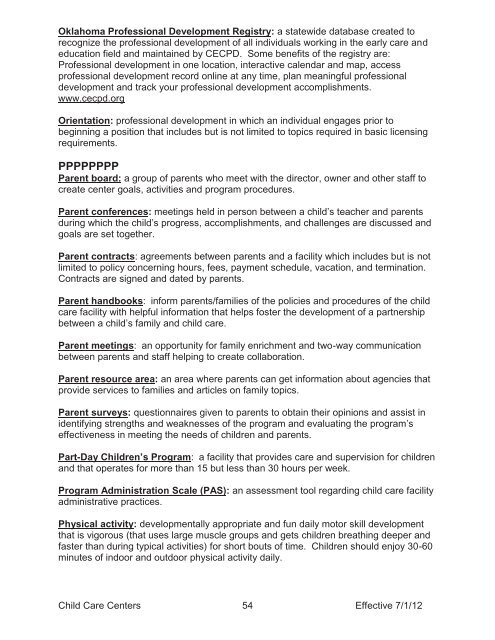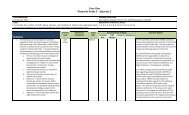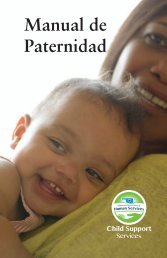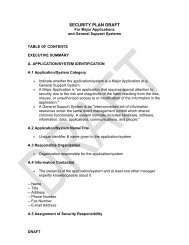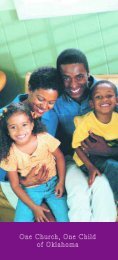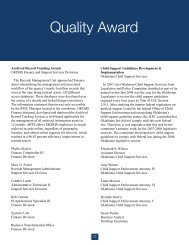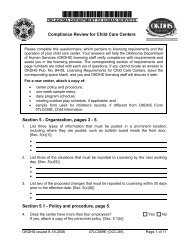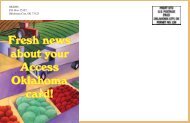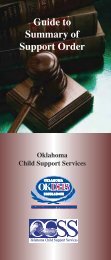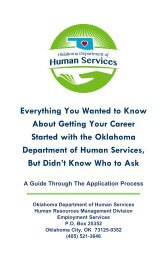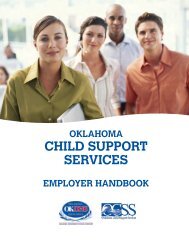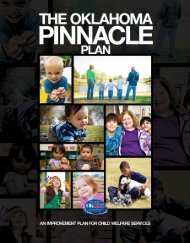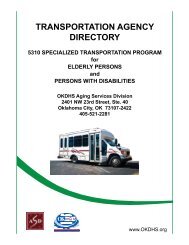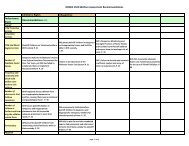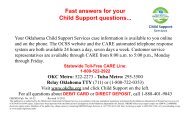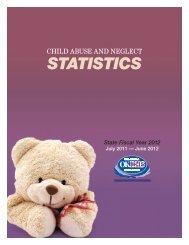Reaching for the Stars - Oklahoma Department of Human Services
Reaching for the Stars - Oklahoma Department of Human Services
Reaching for the Stars - Oklahoma Department of Human Services
Create successful ePaper yourself
Turn your PDF publications into a flip-book with our unique Google optimized e-Paper software.
<strong>Oklahoma</strong> Pr<strong>of</strong>essional Development Registry: a statewide database created to<br />
recognize <strong>the</strong> pr<strong>of</strong>essional development <strong>of</strong> all individuals working in <strong>the</strong> early care and<br />
education field and maintained by CECPD. Some benefits <strong>of</strong> <strong>the</strong> registry are:<br />
Pr<strong>of</strong>essional development in one location, interactive calendar and map, access<br />
pr<strong>of</strong>essional development record online at any time, plan meaningful pr<strong>of</strong>essional<br />
development and track your pr<strong>of</strong>essional development accomplishments.<br />
www.cecpd.org<br />
Orientation: pr<strong>of</strong>essional development in which an individual engages prior to<br />
beginning a position that includes but is not limited to topics required in basic licensing<br />
requirements.<br />
PPPPPPPP<br />
Parent board: a group <strong>of</strong> parents who meet with <strong>the</strong> director, owner and o<strong>the</strong>r staff to<br />
create center goals, activities and program procedures.<br />
Parent conferences: meetings held in person between a child’s teacher and parents<br />
during which <strong>the</strong> child’s progress, accomplishments, and challenges are discussed and<br />
goals are set toge<strong>the</strong>r.<br />
Parent contracts: agreements between parents and a facility which includes but is not<br />
limited to policy concerning hours, fees, payment schedule, vacation, and termination.<br />
Contracts are signed and dated by parents.<br />
Parent handbooks: in<strong>for</strong>m parents/families <strong>of</strong> <strong>the</strong> policies and procedures <strong>of</strong> <strong>the</strong> child<br />
care facility with helpful in<strong>for</strong>mation that helps foster <strong>the</strong> development <strong>of</strong> a partnership<br />
between a child’s family and child care.<br />
Parent meetings: an opportunity <strong>for</strong> family enrichment and two-way communication<br />
between parents and staff helping to create collaboration.<br />
Parent resource area: an area where parents can get in<strong>for</strong>mation about agencies that<br />
provide services to families and articles on family topics.<br />
Parent surveys: questionnaires given to parents to obtain <strong>the</strong>ir opinions and assist in<br />
identifying strengths and weaknesses <strong>of</strong> <strong>the</strong> program and evaluating <strong>the</strong> program’s<br />
effectiveness in meeting <strong>the</strong> needs <strong>of</strong> children and parents.<br />
Part-Day Children’s Program: a facility that provides care and supervision <strong>for</strong> children<br />
and that operates <strong>for</strong> more than 15 but less than 30 hours per week.<br />
Program Administration Scale (PAS): an assessment tool regarding child care facility<br />
administrative practices.<br />
Physical activity: developmentally appropriate and fun daily motor skill development<br />
that is vigorous (that uses large muscle groups and gets children breathing deeper and<br />
faster than during typical activities) <strong>for</strong> short bouts <strong>of</strong> time. Children should enjoy 30-60<br />
minutes <strong>of</strong> indoor and outdoor physical activity daily.<br />
Child Care Centers 54 Effective 7/1/12


